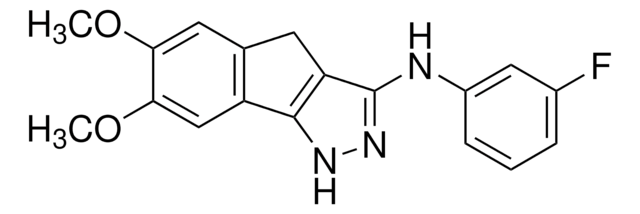SML1555
MS023 hydrochloride
≥98% (HPLC)
Synonim(y):
N1-((4-(4-Isopropoxyphenyl)-1H-pyrrol-3-yl)methyl)-N1-methylethane-1,2-diamine hydrochloride, N1-Methyl-N1-[[4-[4-(1-methylethoxy)phenyl]-1H-pyrrol-3-yl]methyl]-1,2-ethanediamine hydrochloride
About This Item
Polecane produkty
Poziom jakości
Próba
≥98% (HPLC)
Postać
powder
warunki przechowywania
desiccated
kolor
white to light brown
rozpuszczalność
H2O: 20 mg/mL, clear
temp. przechowywania
−20°C
ciąg SMILES
CN(CCN)CC1=CNC=C1C2=CC=C(OC(C)C)C=C2.[H]Cl
InChI
1S/C17H25N3O.ClH/c1-13(2)21-16-6-4-14(5-7-16)17-11-19-10-15(17)12-20(3)9-8-18;/h4-7,10-11,13,19H,8-9,12,18H2,1-3H3;1H
Klucz InChI
IEZPALXFXHDDHI-UHFFFAOYSA-N
Powiązane kategorie
Działania biochem./fizjol.
To learn about other SGC chemical probes for epigenetic targets, visit sigma.com/sgc
Cechy i korzyści
Inne uwagi
Kod klasy składowania
11 - Combustible Solids
Klasa zagrożenia wodnego (WGK)
WGK 3
Temperatura zapłonu (°F)
Not applicable
Temperatura zapłonu (°C)
Not applicable
Certyfikaty analizy (CoA)
Poszukaj Certyfikaty analizy (CoA), wpisując numer partii/serii produktów. Numery serii i partii można znaleźć na etykiecie produktu po słowach „seria” lub „partia”.
Masz już ten produkt?
Dokumenty związane z niedawno zakupionymi produktami zostały zamieszczone w Bibliotece dokumentów.
Klienci oglądali również te produkty
Produkty
We offer a variety of small molecule research tools, such as transcription factor modulators, inhibitors of chromatin modifying enzymes, and agonists/antagonists for target identification and validation in gene regulation research; a selection of these research tools is shown below.
Nasz zespół naukowców ma doświadczenie we wszystkich obszarach badań, w tym w naukach przyrodniczych, materiałoznawstwie, syntezie chemicznej, chromatografii, analityce i wielu innych dziedzinach.
Skontaktuj się z zespołem ds. pomocy technicznej








